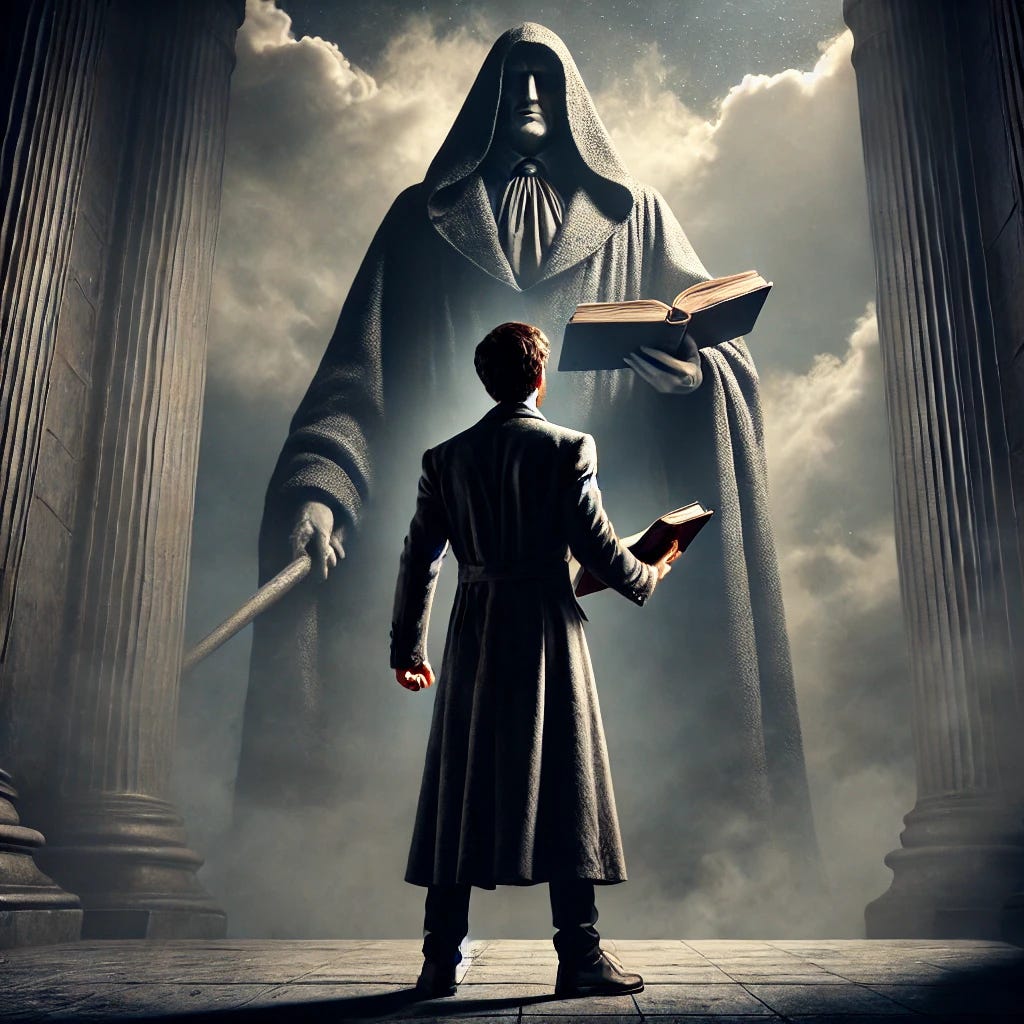The Gollumisation of the University
Too many administrators, professors and students are wandering around, muttering, "My Precious."
If you believe in the importance of free speech, subscribe to support uncensored, fearless writing—the more people who pay, the more time I can devote to this. Free speech matters. I am a university professor suspended because of a free speech issue, so I am not speaking from the bleachers. The button below takes you to that story.
Please subscribe to receive at least three pieces /essays per week with open comments. It’s $6 per month, less than USD 4. Everyone says, "Hey, it’s just a cup of coffee," but please choose my coffee when you come to the Substack counter. Cheers.
Once upon a time, universities were bastions of knowledge and free thought. They were akin to the Shire of Middle Earth – humble, fertile ground for learning, where curiosity thrived unburdened by greed. In those days, higher education was guided by wisdom, but today, many universities have lost sight of that noble purpose.
Over years of chasing prestige and profit, university administrators have gradually morphed into something far darker, more akin to Gollum than Bilbo. They are creatures twisted by obsession, clinging desperately to power and resources.
They fixate on rankings, endowments, and ideological purity, hissing at those who question them. They guard their policies and profits “like a dragon hoards gold,” forgetting the true mission of educating students.
This corruption did not happen overnight. The change in universities has been a slow creep—a long defeat of critical thinking and genuine inquiry. Instead of being guided by wise mentors, universities have listened to the whisper of the Ring, seduced by credentialism, money, and ideology.
The result? Academia’s original soul is nearly unrecognisable, replaced by a gaunt shell fixated on its “precious” status and income.
How many administrators talk about new buildings but never ask, “Hey, are these students leaving this institution different than they came in, not just with more debt?”
“Are they learning anything?”
How many administrators ignore those classes with horrifically high averages, even though everyone knows students share exam answer keys?
Faculty and students have reached an unspoken bargain: the professor does not push the student, and the students don’t complain as long as the grade dispenser, who is only a professor in title, for they profess little, sells students cheap indulgences and a promise that a university degree will release their souls from the stress of future unemployment.
Not so much “As soon as a coin in the coffer rings, a soul from purgatory springs,” but more, “each dollar dropped in learning’s name ensures a life of glory, wealth and fame.”
The university is the institutional equivalent of the helicopter parent, of the buddy parent, where students are encouraged to celebrate their ‘specialness’, and somehow, many believe the institution's duty is not to teach but to coddle and enforce student delusions of competency and sacred individuality.
Criticism of student work can lead to complaints that reach the dean or the department head. The answer is usually to give them a higher mark, which will silence them.
Faculty and department heads are perhaps more exhausted than acquiescent.
Particularly malicious students realise that they can always leave a false accusation in the university-based human rights system, where you are guilty until proven innocent, where the standard of justice is a civil one, the ‘balance of probabilities’ which commands no burden of evidence, and allows a cloak of anonymity to darken the proceedings, where management hires investigators to pursue management driven confirmation bias and where protection of privacy is a codeword for destroying natural justice.
In my case, a student who was bitter about past grades lit a fire that has grown into a raging conflagration of defamation, abuse of process, institutional betrayal, and reputational and career destruction.
I am in my sixteenth month of suspension and demonisation. Strangers in the university community treat me like a criminal (only online, I was, of course, kicked off campus the day I was suspended, one month before even getting charges); only God knows what rumours have reached them; I didn’t think calling the terrorist group Hamas Nazis would offend them so - or were they offended I besmirched their beloved Nazis with the Hamas tag?
It’s an odd point to take offence on, especially when Hamas has its roots in the Muslim Brotherhood. History, if truth is now allowed to be a defence, tells us the founder of the Muslim Brotherhood had a major bromance with Herr Hitler.
The most amusing thing is that my accusers, which include, unfortunately, the top administrator in the University, get granted anonymity, a powerful shield to hide behind to launch wounding arrows of slander and libel.
But such poor, protected ones have no issue with giving my name to many anti-Zionist organisations; one called, most uncreatively, ‘Stop Zionist Hate’ - had me at 33.5K likes and 530 retweets on a post calling me a racist and giving a hot link so keyboard revolutionaries could more easily rip on me without becoming fatigued by excessive mouse clicks.
The Human Rights Department is like one of those scammy shops where everything is always 50% off.
But in this case, it’s a special deal—you can defame and attack at no cost.
After calling Hamas Nazis to a man in Pakistan who was crowing about his dream of a Middle East sans Israel, I hurt a student’s sacred feelings. It tarnished their self-perception of their cherished cosmic significance—the horror.
The wounded student child was also miffed by a low Consumer Behaviour grade I had given her; she, like all my students, views herself as an A student. Any other grade is the academic version of a hate crime.
This student thought that damaging my livelihood, my mortgage, my reputation, and my physical and mental health was appropriate vengeance for getting 69% on an assignment.
So don’t play with defamatory matches, kids. You might burn down the house, and just because it’s someone else’s house doesn’t make it right.
A Festival of Specialness
In the 18th century, ignorant parents gave their children Mrs Winslow’s Soothing Syrup; it put the child to sleep and offered no medical benefit. Its active ingredient was morphine.
Now classrooms have Dr. Smith’s Soothing Syrup, but the active ingredient is a 20% grade bump. It's better than a screaming baby or student.
Credentialism is at the heart of this transformation, a force both beguiling and dangerous. It promises great power—the prestige of degrees and titles—but corrupts education's purpose. Just as the Ring ensnared Gollum with visions of power while enslaving him, modern degrees have become “One Ring” for students and universities alike.
Degrees are touted as all-powerful keys to success, yet too often, they bind young people to mountains of debt and disillusionment. Instead of pursuing knowledge for its own sake, students are told that the diploma – so precious – is all that matters. In turn, universities measure their success by the number of diplomas dispensed, not the wisdom imparted.
The original goal—genuine learning—becomes secondary to the corrupting allure of credentials. Universities proudly brandish their certification programs, MBA factories, and endless graduate degrees. Each shiny diploma is presented as a talisman of power, but it confers only an illusion of competence.
Pursuing credentials for their own sake has become a curse on higher education, draining it of meaning.
Universities have industrialised the granting of degrees, replacing the once-natural garden of intellect with the mechanical stamp of diplomas. In chasing these golden tickets, academia risks forgetting that true education is about the journey of the mind, not the quantity of paper on the wall.
Grade Inflation – The Illusion of Greatness
Another symptom of academia’s decline is grade inflation, a widespread illusion of greatness. In today’s universities, almost everyone is deemed exceptional, and every participant receives a trophy.
Grade inflation offers a comforting lie: it reassures students (and their tuition-paying parents) that all is well. Universities avoid tough truths – failing students who haven’t mastered the material – to keep everyone happy.
The illusion cannot hold up in the real world. Employers and graduate schools eventually discover that many of these star students are unprepared, and the students themselves crash into the hard reality of the workforce.
International Student Revenue as a Corrupting Influence
In their quest for ever-greater treasure, universities have also turned to international students as a source of revenue. These students are often charged exorbitant tuition fees, making them the golden hoard that university administrators love to sleep upon.
The university is the mighty dragon Smaug, curled atop a heap of gold.
Administrators smile at the growing influx of tuition dollars from overseas, expanding their financial empire while giving little thought to the effects on educational quality or student well-being.
They boast about diversity and global perspective, but often, the underlying motive is the glitter of gold.
It’s not that welcoming international students is bad – far from it; a diverse student body can greatly enrich learning. The problem is when these students are valued primarily as cash cows rather than learners. Universities intoxicated by this revenue may admit more students than they can properly educate or charge sky-high fees without adequate support, all to keep the treasure pile growing.
This greedy focus warps priorities. Courses are tailored to attract more paying customers rather than impart critical knowledge. Popular programs that earn money (often in business or engineering) are expanding rapidly. At the same time, humanities or fundamental sciences—the heart of a broad education—are left to wither if they don’t turn a profit.
How many colleges and universities are caught up in the gold rush called international students?
With internationals, there is an academic omerta of sorts.
The administration doesn’t admit that many international students are there simply to earn the right to open the door to permanent residency; students are silent about their aims; professors don’t admit that you can’t have a real post-secondary course when students have poor language skills or a poor education, saying that would be racist. But silence all around.
Students have admitted that many language proficiency test results involved fraud or the timely transfer of envelopes of cash. Even tonight, a student told me that the Canadian government’s language test for a work visa has now set up a burgeoning industry for test-taking doppelgangers; they find it easy to dupe the “they all look the same to me” crack invigilator at the testing centre.
Of course, there are always exceptions, but it’s discouraging to put your heart into a lecture and ask question after question to stunned silence.
I always ask them if the sun comes up; someone will meekly respond, “Yes.” And I say, “Good, you guys can talk”, to weak laughter, and we move on to more silence.
While you’d never get them to admit it, many administrators view teaching as an operational cost to be lowered, and learning is an assumed output.
But it is a foolish assumption; the edu-industrial complex has many incentives to make students happy with undeserved grades, plush living conditions and a social eco-system set up to maximise social enjoyment and epicurean and libidinous indulgences.
While learning might be mentioned briefly in the viewbook with the same multi-ethnic shot every school seems to use, it’s more about the pictures.
The University - The Hobbit Hole of Groupthink.
A fellow professor said they feared signing a free speech petition because the university might not renew their contracts if the VP and VPA saw their name on the petition. The irony is rich.
Many universities and colleges are set on hiring only sessional instructors. It’s a cost-saving move and a power move. Both parties know they can be fired easily or at least not rehired. While creating such a compliant employee may please management, it is not in the best interest of creating lively academic discourse.
A Jewish student who, after the showy unfurling of a Palestinian flag to the rapturous delight of all the faculty on stage, tells me they are afraid to go to convocation.
Most universities today have administrative bodies to ensure campus equity, inclusion, and justice. These bodies are often called Human Rights Offices or Diversity and Equity Committees. In theory, these bodies should be forces for good, protecting students and staff from harassment or discrimination.
Unfortunately, many have become corrupt tribunals and kangaroo courts that serve ideology over justice.
Several Jewish students have said that spending the minimum of time on campus is their preferred option, and several have told me how they fear having to take a mandatory course from a man who has publicly supported terrorism, called for the death of her nation, and called Zionist's devil worshippers.
I have discovered the University has two standards of free speech: one for Muslims and any like-minded individuals, with the reason coming down to some variant of ‘I don’t want to offend them, have them call us an Islamophobe or start camping on the front lawn.’
In contrast, while the former alliance have a de facto defamation pass, the standards for Christians, Jews and others who don’t hold to popular leftist narratives de jour is more along the lines of, “Shut up or else.”
If you are a white male, you are already guilty, so stay quiet. Keep your eyes down; if you are not in class, you should head for an exit.
You can be sure that nobody will push intellectual or procedural boundaries in this culture. Faculty know the power of a false allegation from a student. It’s guilty until proven innocent, and professors would be wise not to attend official meetings unless they are mandatory, and they should be sure to give high grades no matter what.
The Decline
I’ve seen students who cannot listen to an argument for more than a few moments; their eyes are dull, and they do not realise that their boredom is more related to their lack of engagement and less so to the delivery of the material, they simply cannot keep off their phones, and believe that not reading their text (in the classes where the profs haven't given up and said just read the powerpoints) is a badge of merit, and who resent any exam that has questions that they weren’t able to find the night before on Coursehero, Chegg, or whatever sites contain previous exam questions.
If the test is online, it’s just a data entry skill test, but if it’s in class, students may be cruelly forced to memorise answers—the horror of it all - travelling to a physical classroom.
It’s 2025.
Much of academia seems to have forgotten why they are there.
What does it even mean to teach? Is it not about bringing together two parties, one with the intrinsic drive to learn and one with the intrinsic drive to show, explain, transform, motivate and inspire the student, to have them leave the classroom, even if the effect is ever so slight, a changed person?
Or is it to slog through the classtime with all the dignity of the person who slips on a pair of Crocs and, dancing around the driveway puddle, darts out to grab the newspaper from the base of the driveway before it is run over again by the neighbour?
(Note: That assumes that anyone reads a paper newspaper. I think there are only about three of us now).
The New Campus Cult, The Power of Sauron
Perhaps the most heartbreaking aspect of today’s universities is the shift from education to indoctrination. Instead of teaching students how to think, many institutions are preoccupied with telling students what to think. Modern students are often handed ideological rings from day one – belief systems and dogmas they are told are the absolute truth and must never be questioned – without being warned of the weight or potential danger. They carry these ideas, believing them to be pure enlightenment, when they might be carrying the things hindering them from seeing the world.
In a healthy educational environment, diverse perspectives clash and spark; students learn to forge their understanding through that friction. Today, however, many campuses have an orthodoxy—a single ring of power that rules them all—a set of “correct” views on social and political matters that everyone is expected to embrace.
Professors who challenge these views may find themselves marginalised. Students quickly learn that challenging the reigning ideology is risky, so genuine inquiry falls by the wayside. The result is a kind of intellectual chain, lightly worn because the wearer is oblivious to it.
The students march forward, dutifully reciting theories and slogans they’ve absorbed, much like an army under the spell of a charismatic leader, never realising they have lost the ability to question these ideas.
However, inspiration is not the only failing; the classroom can sometimes become a dangerous church, which is regressive whether the religion is wokeism, some popular new teaching or the insistence that bumps in the ground at residential schools must be bodies. Even if narratives are wrong, if they have good intentions, they must be taught.
The modern university emerged from the Enlightenment as a space for reasoned inquiry, breaking from the church’s dominance over education.
Today, some classrooms have become ideological soapboxes for the woke religion—with adherents more zealous than any Anglican and who don’t merely want to proselytise; they want forced conversions.
Such teaching replaces reasoned debate with dogma and inquiry with moral purity tests. Universities risk becoming medieval seminaries, where heretics are punished, and only “correct” beliefs are tolerated.
The institutions that once freed knowledge from religious orthodoxy now enforce a new one.
In this place, diversity is celebrated in every form except the one that matters most: diversity of thought. We’ve become a system that pays lip service to the idea of critical thinking while actively stamping it out.
The modern university is no longer a marketplace of ideas; it’s a pulpit, and the professors are the preachers. God help the student who dares to question the sermon.
The classroom should be where ideas are tested, not dogma enforced. Yet, increasingly, students are taught that critical thinking is a sin. They’re not encouraged to dismantle arguments, question underlying premises, or identify inconsistencies. Instead, they’re told to accept cheap, tawdry arguments at face value—often shallow, emotionally charged, and devoid of intellectual rigour.
George Orwell once warned, “The point is that we are all capable of believing things which we know to be untrue, and then, when we are finally proved wrong, impudently twisting the facts to show that we were right.”1
Orwell’s words ring eerily true in today’s universities. Students are no longer taught to think; they’re taught to obey. They’re raised on a diet of TikTok arguments and soundbites, never having read a book cover to cover, let alone engaged with challenging ideas.
The result is a generation of intellectually feeble minds incapable of defending their beliefs with reason.
Instead, they retreat to moral grandstanding, treating disagreement as a sign of moral failing rather than an opportunity for dialogue.
Christopher Hitchens, that great defender of free speech and intellectual rigour, once said, “Take the risk of thinking for yourself. Much more happiness, truth, beauty, and wisdom will come to you that way.”2
But how can students think for themselves when they’re constantly told what to think?
When professors present their views as incontrovertible truths, students learn that education is not about exploration but repetition. They learn to mimic, not to question.
The Consequences: A Generation Raised Not to Think
Credentialism, grade inflation, profit-chasing, kangaroo courts, and indoctrination all contribute to the overarching crisis: the death of critical thinking in our universities. Critical thinking is precious because it allows societies to progress through innovation, debate, and reflection. Universities that once prided themselves on producing independent thinkers now seem to churn out conformists, each clutching a degree and a standardised set of opinions. We are witnessing the gradual decline of academia’s vitality, a decline that uncannily resembles the tragic fate of Gollum.
In the climactic scene of The Lord of the Rings, Gollum, consumed by his obsession, falls into the fires of Mount Doom while clinging to the Ring. His treasure so enthrals him that he cannot let it go, even if it means his destruction.
This scene is a perfect metaphor for what may happen to universities if they refuse to reform.
An institution that will not abandon its corrupt habits—treating tuition dollars, rankings, and rigid ideologies as more important than truth and learning—is ultimately doomed. It may take time, but reality has a way of catching up. Public trust erodes.
Eventually, the once-mighty university could collapse under the weight of its self-inflicted flaws, much as Moria fell when the dwarves dug too greedily and too deep.
It’s a stark image: a great tower crumbling into a smoking chasm, administrators and officials tumbling down, still gripping their meaningless awards and doctrines. Yet, like any cautionary tale, it highlights what must be avoided.
To avoid this fate, the spell of obsession must be broken, and the true purpose of the university must be restored before it is too late. The consequences of this intellectual decay are dire.
A generation raised not to think is a generation ripe for manipulation.
As Douglas Murray observes in The Madness of Crowds, “We are living through a postmodern era in which the grand narratives of religion and political ideology have collapsed, and yet people still have a need to believe in something.”3
That “something” is often the shallow, moralistic ideology in classrooms. Students are taught to see the world in binary terms: good versus evil, oppressed versus oppressor, enlightened versus unenlightened.
As Charles Murray notes in The Curmudgeon’s Guide to Getting Ahead, “The purpose of a liberal education is to learn how to think, not what to think.” Yet, our universities are doing the exact opposite.4
Mark Steyn, never one to mince words, puts it bluntly: “The problem with the world is that the stupid are cocksure and the intelligent are full of doubt.”5
In today’s universities, the “stupid” are the ones who parrot the professor’s views with unwavering certainty, while the “intelligent” are those who dare to ask questions—and are promptly punished for it.’
Conclusion: De-Gollumising the University
The current state of higher education might seem as dire as the darkest moments in The Lord of the Rings, but remember that hope remains even in those stories. The Fellowship did not give up on Middle-earth; we should not give up on academia.
However, we also need to stop viewing the university as the warm body depository for all 18-year-olds; trades are crying out for workers, and this absurd academic credentialism that looks down on those who don’t have degrees is foolish, unhelpful and wrong.
Most learning in life is experiential and self-driven anyway.
Reclaiming the university means fighting for critical thinking, open inquiry, and genuine learning against the forces that have corrupted it. Students, professors, and university leaders must find the courage to challenge the status quo—to slay the metaphorical dragons and drive out the creeping shadow of Mordor from campus.
This could mean enforcing academic honesty in grading, prioritising quality of education over quantity of enrollment, and - again - not sending every 18-year-old biological life form to university.
As Gandalf said, “Even the smallest person can change the course of the future.” Likewise, even a small group of determined people within academia can start to change its course.
Don’t look at me; I’m suspended and about to be fired.
In the end, academia's true treasure is not a ring, a rank, or a revenue stream—it is knowledge. When pursued for its own sake and guided by ethical wisdom, knowledge has a light that can outshine any darkness. It’s time to restore that light.
The journey will require wisdom, humility, and a bit of Hobbit-like tenacity. But if we succeed, the universities can once again become places of wonder and discovery, where minds are free – a fellowship of scholars united not by a ring of power but by the shared quest for truth.
The university was never meant to be a church. It was meant to be a place where ideas clash, minds are sharpened, and truth is pursued—not enforced.
Students deserve an education that teaches them how to think, not what to think.
They deserve a university that values intellectual diversity, not ideological conformity. They deserve professors who see themselves as guides, not preachers. They deserved to be pushed.
True learning is always accompanied by effort and sweat. Students must also reframe their reasons for going to university.
Society mandates credentialing, such as a university degree, not because they are needed but because it keeps the edu-industrial gears turning.
Students deserve administrators driven by a desire to create critical thinkers, not people who wander around stroking their degrees, muttering to themselves, “My precious, my precious.”
However, students must also realise that learning is not a delivered product that they unwrap and put on an intellectual shelf; it is a dynamic output of engagement and effort.
Adults must lead. They must stop allowing post-secondary education to happily exist as a mindless, expensive rite of passage, an expensive toll tax to gain access to future employment.
They must address a culture that is too distracted to think critically. They must ban courses that are little more than professorial proselytising and create institutions that do not act as if affirming that academic gears are turning. Their classroom noise means that we have true learning.
Real learning is a tiny plateau in a craggy domain.
As Orwell stated, “In a time of universal deceit, telling the truth is a revolutionary act.”6
Education is too precious to let it crumble and fall into the dark academic Mordor of greed, obsessive credentialism, rigid political conformity, dangerous human rights tribunals, religious hive-mindedness, and the delusion that giving out more parchment means that students have grown intellectually and learned critical thinking skills.
Orwell, G. (1946). In Front of Your Nose. Tribune.
Hitchens, Christopher. Letters to a Young Contrarian.
Murray, Douglas. The Madness of Crowds.
Murray, Charles. The Curmudgeon’s Guide to Getting Ahead.
Steyn, Mark. After America.
Orwell, George. 1984.















Paul - Maybe you could band together with other liberal (in the true sense of the word) thinkers to start a new liberal arts college. I was fascinated to just read about the founding of the University of Austin Texas, UATX, which was founded for this exact purpose.
https://substack.com/redirect/557df75f-c18a-4786-8167-1e3c5bee6778?j=eyJ1IjoiMXYxMTU3In0.U6LrI-UftQRQ_b1TxPiiCwnMHMFx9gkcN6mY3bmfnXI
Paul, do stats exist demonstrating the ballooning of university “admin” expenditures and shrinking “teaching” expenditures over the past 20-30 years? Is such data accessible, whether for a specific university or across the province?